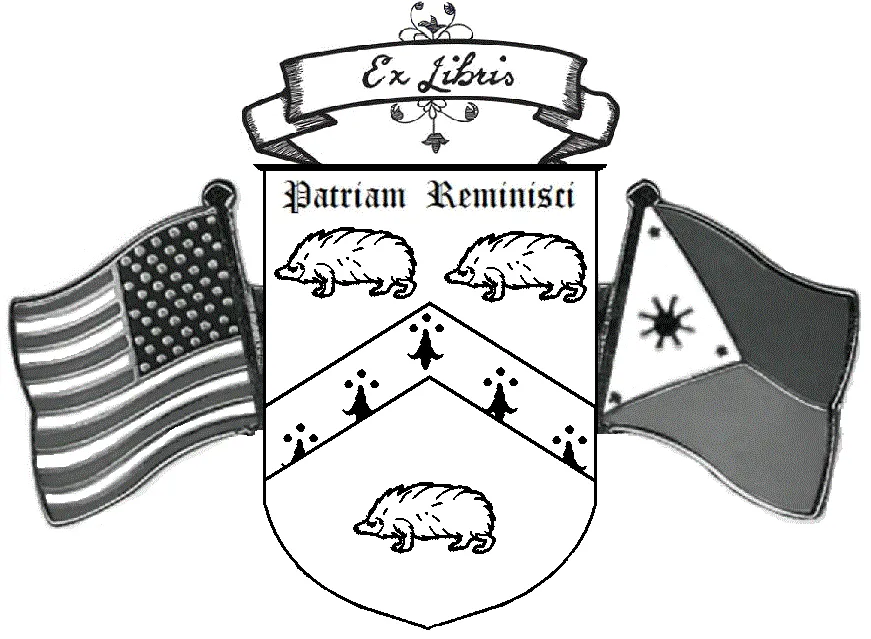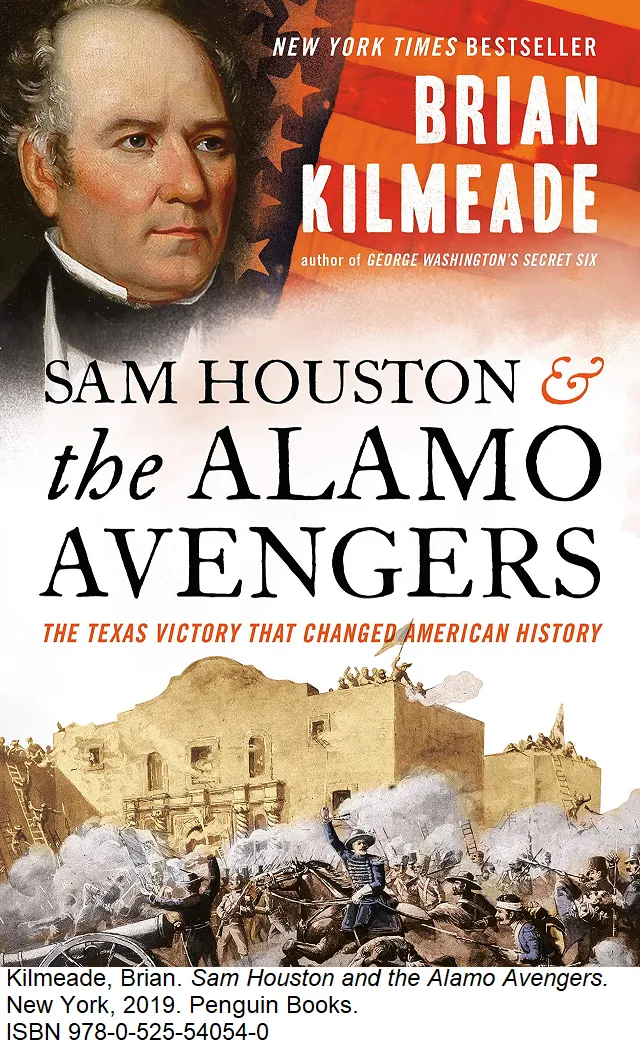Well, after reading 2 biographies of a Russian empress and an Alev Croutier book that was less an academic exercise and more a fantasy-inducing glimpse into the world of a Turkish harem (preceded of course by innumerable volumes about China), it was time for some good, old-fashioned Texana. Because after all, who doesn't love a good shoot-em-up Western? And what's better than a shoot-em-up Western? Why, a shoot-em-up Western that's a true story...
...Well, 'true,' give or take a hell of a lot of spin.
And "shoot-em-up" and "spin" are both things which Brian Kilmeade, famous for gripping -if highly idealized- accounts of iconic figures in early American history, knows how to deliver in grand style.
We All Remember
What American doesn't know the tale of the Alamo? Even kindergarteners in Maine or Hawaii who couldn't find San Antonio if you handed them a map of Bexar County have chased their siblings and neighbors around the house with cap-pistols shouting "remember the Alamo" and singing "Davey, Daaaaavey Crockett, King of the wild frontier!" Of course, for most of them it's not until they get a little older that they realize "wait a minute, Crockett died at the Alamo, along with everyone defending it. That's why 'remember' is part of the slogan."
For Texans though, the story hits a little closer to home. Mexican President-and-Generalissimo Lopez de Santa Anna's no-quarter assault on the rebel-held fortress was the first defeat Texas suffered (one of two brutally violent defeats which we would suffer in the same month, the other being at Goliad) in the revolution that would turn Texas from an underdeveloped frontier province of Mexico into an independent nation (never mind that it was only independent for seven years, dammit; we're proud of it).
And Brian Kilmeade... well, he is very obviously trying to make it sound exactly like that. The problem is, if he set out to define the Texas Revolution as a defiant stand against tyranny (as it is typically viewed), then he really should have told it from the viewpoint of a Stephen F. Austin, a lifelong Texan...
...and not Sam Houston, an American rabble-rouser who went to Texas with the express purpose of subverting it from Mexico.
An Awkward Start
As an American patriot reading the first few chapters, I found myself cringing a little and wanting to whisper to the author, "uh, you were trying to make us the good guys, right?" The decision to make Sam Houston (who didn't set foot in Texas until the events leading to the confrontation with Santa Anna were already coming to a head), rather than Stephen F. Austin (raised in Texas by parents who went there with the full blessing of the Mexican government to develop the territory at a time when the U.S. didn't own a square inch west of the Mississippi) the principle protagonist, means the book is very, very much a flag-waving, chest-beating, "America vs not-America" story, with Texas merely being the battleground. Of course, this is to be expected from Kilmeade, but it was a little jarring.

Far from trying to sweep inconvenient details under the rug, Kilmeade almost seems proud of the fact that certain high-ranking Americans, including Houston and his mentor, Andrew Jackson, had long-held ambitions of "breaking [Texas] off from Mexico, and annexing it to the United States (p. 16)." In fact, he does not bother hiding the fact that Jackson contemplated doing this by military means (p. 16). He actually sounds disappointed about Mexico's revolution from Spain, simply because it made such an endeavor difficult to justify.
For one thing, the players had changed. Mexico had gained its independence from Spain in 1821. Then, three years later, the new nation south of the border adopted a federal constitution that echoed the U.S. Constitution. Instead of freeing Texas from a European colonial power, Jackson would now have to coax it away from a democratic republic that had recently won its freedom. (p. 9)
It's really not a good start to your "good guys vs bad guys" narrative when your hero-figure comes across less as Captain America than he does as Count Dooku to a Darth Sidious played by Andrew Jackson.
"Milord, I bear ill news. Mexico is a republic now. That means we can't 'liberate' them."
"No matter, my young apprentice. Go to Texas yourself, and start a rebellion."
"At once, Milord."
It's the first time I've read a book about the Texas revolution where the first three chapters left me whispering "hm... Santa Anna kind of had a point."
In Kilmeade's defense, he does try to justify some of this plotting and scheming by portraying Texas as something that had once been America's but was stolen by Mexico, with Andrew Jackson merely trying to steal it back.
President Thomas Jefferson had believed Texas to be part of the 1803 Louisiana Purchase... But in negotiating with Spain, [John ] Adams agreed to make the Sabine River -rather than the Rio Grande- the new border between American territory and Spanish, effectively handing over all of Texas to Spain. (p. 8)
The narrative surrounding Jackson and his protege, Houston, throughout the book is one of "reclaiming what was ours." In fact, as a Texan, I felt a little bit like an ethnic Mongolian living in Nei Mongguo, hearing Xi Jinping describe Genghis Khan as an "important figure of Chinese history" when I looked at the picture insert between pages 152 and 153 and saw a caption describing the Texas Revolution as "America's fight for Texas." Considering that the author plainly admits this 1803 claim over Texas (which is debatable to begin with) was given up under no duress in a signed treaty, this justification is thin. I cannot help but be reminded of the way Chinese diplomats in recent decades have casually shrugged aside old treaties by simply saying "well, that treaty was signed when we were weak and now we are not," and anyone who has read any of this blog knows that no parallels with China are ever flattering in my eyes.
Of course, Kilmeade also ascribes this "Make Texas America Again" mentality to the settlers, using such "sterling" sources as Houston's wishful thinking (p. 25). Meanwhile, he barely glosses over the fact that Stephen F. Austin and his earlier band of American settlers in Texas had no ambitions of bringing their adopted home province into the country they'd run away from and in fact, considered themselves faithful citizens of Mexico until Santa Anna came along and changed their minds by tripling their taxes, disarming them and hinting at the possibility of slaughtering their families. This fact gets half a paragraph of passing mention on p. 29 after being mocked on p. 28.
[H]e could now see Santa Anna had no respect for the Texians(1) and wanted to make them Mexicans.
The fact that "making them Mexicans" is exactly what the settlers agreed to (and the first waves, led by Austin, understood that) gets left out of the discussion.
Granted, none of this "In order to move the border, it was first necessary to move Americans to the other side of it" talk would have sounded the least bit out of place in a George Friedman book that eschews notions of good and evil and simply, casually describes nations doing what they all (including the US) must do, which frequently includes vying for power in scheming, underhanded ways. Still, the elephant in the room is that while all nations engage in imperialism and expansion, the U.S., as a self-professed anti-imperial project, has to do a better job of coming up with excuses to justify it than most nations do, and on this score Kilmeade (in his insistence to portray the struggle of a few American expats as if it was somehow America's fight) fails, miserably.
But It Bounces Back
The notion I mentioned earlier, namely, that Santa Anna was right, dies quickly upon the generalissimo's actual introduction. The general's fluid values (made most manifest in that he fought in both of Mexico's revolution attempts against Spain, once for the crown (p. 23) and once for the rebels (p. 24)), his cruelty (p. 82, 107, 132), and his lack of regard for even his own men (p. 127, 134-5) do a fine job of making the reader want to see him beaten, regardless of the dubious origins of the fight against him. When the author describes how the war had become less about a cause or a nation and more about avenging the massacres at the Alamo and Goliad (p. 189) it's hard to find fault with Houston's fight at this point, even as Macchiavellian as it was earlier on.
Indeed, this paradoxical lack of empathy (p. 186) with the way he seemed to charm those he met off of the battlefield (p. 105, 137, 222) and his ability to (in his own mind) justify everything he did (p. 25, 138, 213) all have hints of sociopathy in them.
If you try to ignore that Sam Houston shows all the same traits except one (his lack of empathy is limited to the enemy), this makes el Presidente a compelling villain. It's difficult not to feel a swell of "how's that karma taste" during the account of his crushing defeat by a smaller, poorly-armed ragtag rabble at the battle of San Jacinto.
Memorable Characters
The book's cast of lovable miscreants is so well-portrayed that one almost forgets one is reading a work of non-fiction. The author takes pride in pointing out the way so many of the early Texas Revolutionists were Americans who blew their chance back home in polite society and had decided to give the wild frontier a try (I can relate).
- James Bowie, who went from knifeslinging murderer to a devout Catholic with a Mexican politician's daughter for a wife (p. 22 & 23)
- William Travis, who was a young lawyer in Alabama until he left his cheating wife behind (along with his son) and went west to avoid facing justice for killing the man who slept with his wife (p. 65, 93)
- Robert Potter, who had been a U.S. Congressmen until he fled west to escape justice for castrating three men he thought had slept with his wife (p. 141)
- James Fannin, who was one of west Point's most promising cadets until he washed out and ran himself into debt, forcing him to flee west (p. 145)
- Moseley Baker, who was running from debts and allegations of bank fraud in Alabama (p. 172)
By the time the book is finished, the reader feels they could almost say "Thank God for failed young men and cheating wives. They built Texas." And the author shows himself to be far more skilled with characters than he is with politics, because unlike Houston, the men under his command come across as being likeable.
Of course, it is not only the Texas rebels who are portrayed so memorably. The author manages to avoid the "lookit all dem eeeeeevil Mexy-kins" mindset that pervades a great many books about the Texas Revolution. General Fernandez Castrillon comes across as a valiant and noble gentleman-soldier (p. 135) who refuses to abandon a dignity that borders on hauteur even at the moment of his death, shot as he walks away with his arms crossed in disgust from a cannon that has been abandoned by all of his men in the midst of the battle of San Jacinto (p. 207). General Jose de Urrea as well gets high praise for both his tactical genius and his mercy toward the vanquished (p. 157), at least until Santa Anna overrides him on the very next page. The picture insert gushes about Urrea being "the best of Mexico's generals," pointing out that he did not lose a single one of his battles with the Texas rebels.
I was quite pleased that in the book's (largely successful) attempts to cast Santa Anna himself as a monster, they stopped short of doing the same to every one of his countrymen. The "us always good, them always bad" trap is just too easy to fall into in any book about a war.
So Is It Worth Reading?
Well, if you're from Mexico it might get under your skin a bit, for the same reason that nobody in Britain likes reading about George Washington and no American likes reading about Vietnam. No one likes to see their country lose, especially when a case can be made to call them the bad guy (notwithstanding my earlier statements that Houston comes across as something less than a hero himself).
I won't lie though, I liked it. It's emotional, it's well-researched for the most part (give or take the author's penchant for treating memoirs as fact), and it's filled with details. The battles read like they could have been lifted right from the pages of Tolkien (if you give the orcs and elves muskets and cannons), and there is almost no breathing space between high-point and high-point. It even manages to poke fun at itself once or twice. For example, on page 71 the author writes with tongue in cheek that Erastus "Deaf" Smith was viewed by Houston as a "natural scout." It goes on to say "he had become 'the eyes of the army.' " My copy now has a notation in the margin in a light purple pen that reads "well I'm damned glad he wasn't the ears."
My one big complaint, upon which I keep harping, is the author's frustrating decision to build the book around Sam Houston. The narrative of "valiant free men defending their homes against murderous tyranny" would have been a lot easier to swallow if it had been written from the viewpoint of Stephen F. Austin, who came west with a band of settlers with the understanding "we'll use American agricultural skill to develop land given by Mexico, live like Americans, pay our Taxes to Mexico, and Washington and Mexico City will both stay out of our business." Then, caught between the machinations of Sam Houston and Santa Anna, he was forced to choose sides between the one who saw him as a pawn to be used and the one who saw him as a pest to be exterminated.
I would have felt no guilt at all rooting for a character like that. Though I'll admit, the way such a plot sets up Houston and Santa Anna as dueling villains would make Sam Houston's landslide victory over Austin in the Republic of Texas's first presidential election a bit hard to view as a happy ending, and the annexation of Austin's "new country" by the country Austin's father fled from would have seemed at best bittersweet. Perhaps the author's decision to cast Houston as the hero was so the hero could win.
Though I'll say this. After reading this book of Americans pouring in by the thousands into a disputed Mexican province, then becoming the majority, declaring independence, defeating the Mexican Army and joining the U.S. as a state, I'm suddenly filled with a mischievous desire to round up a few hundred thousand Americans and move to Taiwan.
(1) The term "Texan" didn't enter the English language until after statehood. In the era the book takes place, there were two terms for "one who lives in Texas:" Texian, and Tejano. The former were of American origin (usually white, since the memoirs usually use the term "Anglo-settler"), the latter from Mexico proper.


